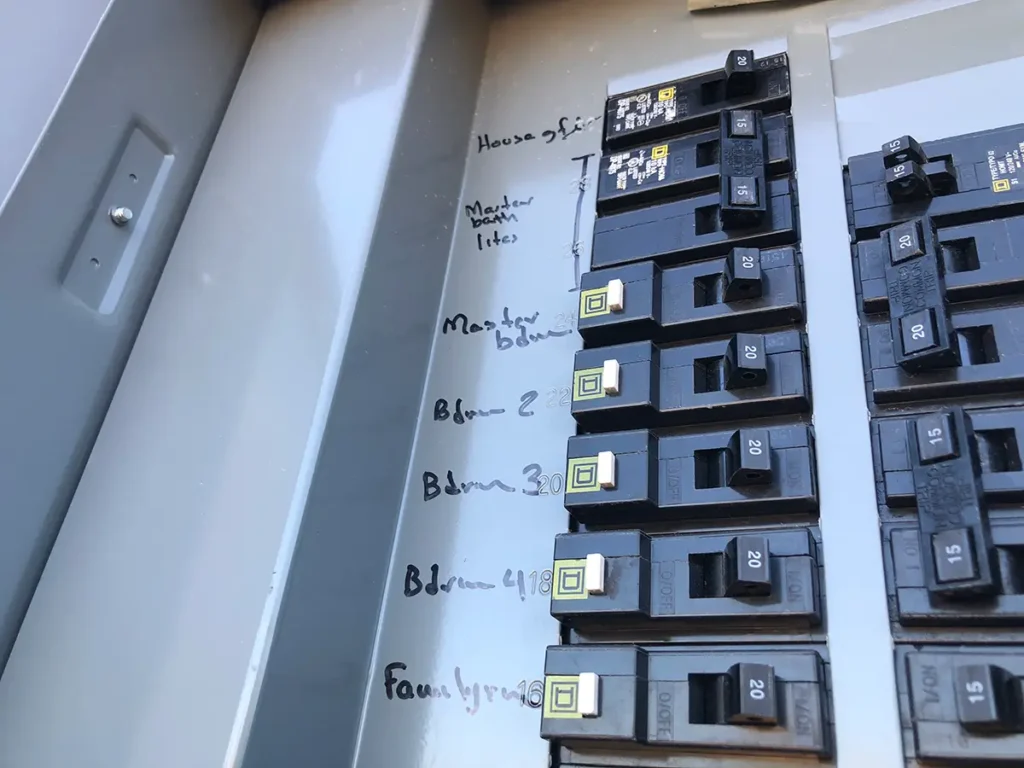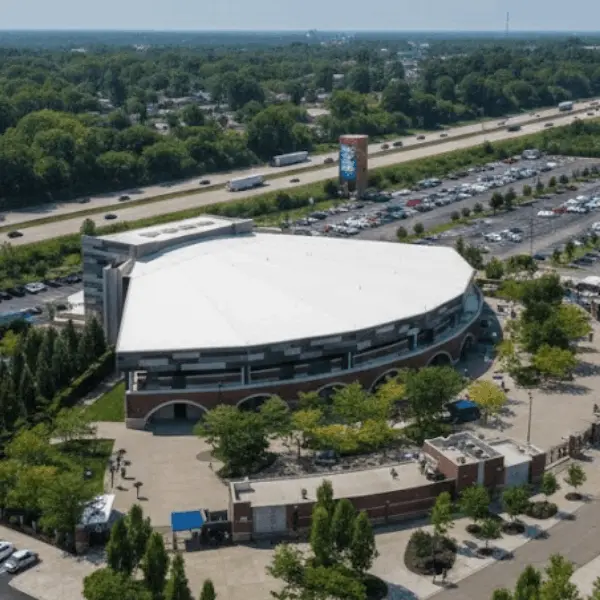Let’s face it – your home’s electrical panel is the core of your entire wiring system and power distribution. It’s essentially mission control for delivering electricity safely throughout your house. So when that circuit breaker panel starts showing signs of issues, it’s absolutely crucial to address them promptly before minor problems potentially escalate into serious safety hazards.
But how do you determine whether your panel simply needs some repairs or if full-on replacement is the smarter long-term solution? There’s a lot to weigh – from the panel’s age and existing condition to costs, safety factors, and even residential code requirements in your area. Trying to stretch the life of an outdated or compromised electrical panel could put your home and family at tremendous risk if not approached properly.

In this guide, we’re breaking down everything homeowners need to know about deciding to repair or replace their circuit breaker panel. We’ll cover the common signs of trouble, what factors to consider for each option, associated costs, and the critical safety implications involved. If your home’s electrical panel has been causing any concerns lately, this is the information you need to make the right call and invest in a safe, reliable system for years to come.
Understanding Circuit Breaker Panels
Before we get into the whole repair or replace debate, we have to first understand what exactly your home’s circuit breaker panel does and how this whole electrical system works. This main panel is basically the heart pumping power throughout your entire place.
Open up that big metal box and you’ll find a bunch of individual circuit breakers controlling the flow of electricity to different areas and appliances hooked up to your home’s wiring. Each breaker acts like a safety switch that trips and cuts power if too much current tries forcing its way through that circuit. It’s a built-in protection feature to prevent overloads that could potentially cause electrical fires or dangerous shock situations.
The main breaker up top controls the overall power supply coming in from the utility line into your panel. Then you’ve got individual branch circuits connecting to breakers rated for specific amperage loads – higher amps for power-hungry stuff like ACs, ovens, etc. and lower 15-20 amp breakers for lighting, outlets, and smaller fixtures.
Newer construction uses more modern panels with enhanced safety capabilities like arc-fault protection to detect dangerous arcing. But a lot of older homes still rock outdated fuse boxes or panels using riskier breaker designs without those extra safeguards.
Regardless of panel type though, they all do that crucial job of regulating and protecting your home’s entire electrical setup. When those circuit breakers or the panel itself start showing issues, it’s a neon sign that your safety could be at risk. Whether you repair or replace really comes down to how severe the problems are and overall condition.
Common Issues with Circuit Breaker Panels
Alright, so we’ve covered what your home’s circuit breaker panel actually does. But how can you tell if yours is starting to crap out and needs some serious attention? There are definitely some red flags to watch out for indicating your panel may be on its last legs.
Signs Your Circuit Breaker Panel Needs Attention
Frequent tripping of breakers – If you’re constantly having to reset tripped breakers, especially for no obvious reasons like major appliances running, it could signal electrical issues causing overloads.
Burning smell or scorch marks – Let’s be real, if you start smelling anything electrical burning or see char marks around the panel, that’s an emergency. Shut off the main breaker ASAP and call an electrician immediately.
Buzzing or humming sounds – Abnormal buzzing, sizzling or humming sounds coming from your panel are never a good sign either. Usually indicates arcing, loose connections or other hazardous conditions brewing.
Warmth around the panel – While a little warmth is normal when lots of circuits are engaged, excessive heat radiating off the panel box points to a serious underlying issue causing dangerous overloads.
Flickering or dimming lights – If you notice lights flickering, dimming or electrical appliances acting up sporadically, it could stem from loose connections or faulty breakers in the panel.
Common Causes of Circuit Breaker Problems
Overloaded circuits – Having too many devices and appliances running on the same circuit can easily overload it and cause breaker trips or even dangerous overheating situations.
Short circuits – Any kind of short circuit where hot and neutral wires cross can allow excessive current flow that rapidly overloads breakers and panels.
Ground faults – Grounding issues that cause leakage currents can also trip breakers constantly as safety mechanisms kick in.
Wear and tear over time – Like anything else, circuit breakers and panels simply wear out eventually after years or decades of use and need replacing.
The bottom line is, any of those glaring red flags deserve an immediate professional inspection. Trying to ignore or work around a faulty electrical panel is just playing with fire…literally. Whether it ends up needing repairs or full replacement, better to address it head-on to keep your home and family safe.
When to Repair a Circuit Breaker Panel
Okay, so your circuit breaker panel is showing some definite signs of issues. But does that automatically mean you need to shell out for a full panel replacement? Not necessarily. In some cases, repairs may be an option to get that electrical brain back into fighting shape.
Minor Issues That Can Be Repaired
Tripped breakers – If you’re dealing with just a single breaker that keeps tripping, it could be as simple as the breaker itself going bad or an overloaded circuit that needs some rerouting.
Loose connections – Over time, those wire connections attaching to breakers can work themselves loose, causing arcing, buzzing noises and potential fire hazards. Tightening and resoldering can fix it.
Outdated breakers – Older properties with ancient breaker types like the riskier aluminum models should consider upgrading to modern designs with better safety features.
Corrosion/rust – Surface rust or corrosion buildup on breakers and bus bars can gradually cause operation issues. A good cleaning and protective coating may be all it needs.
Steps to Repair a Circuit Breaker Panel
For any minor repair work, the first step is shutting off the main breaker to de-energize the entire panel safely. From there, an electrician can test components, tighten connections, replace any faulty breakers and clean/protect bus bars and contact points.
If certain circuits are consistently overloaded, they may reroute some lines to new dedicated breaker slots. Or they could upgrade service cables and breakers to allow for higher amp loads.
Lastly, any exposed wiring will get inspected and circuits tested to ensure proper grounding and no faults before powering the panel back up.
DIY vs. Professional Repair
While some very minor tasks like changing out a single breaker could potentially be DIY’d, any significant repair work should only be done by a licensed professional electrician. Trying to service a live electrical panel when you aren’t properly trained is just begging for shocks, injuries or wiring mistakes that create fire hazards.
The smarter move is calling in pros with the proper experience, tools and safety gear to do the job correctly the first time. A few hundred bucks for repairs beats the thousands a house fire could cost!
Of course, even after repairing your panel, you have to keep an eye out for any recurring issues. If those same problems keep popping back up, it may be a sign that more widespread replacement is inevitable. But for minor, isolated issues, repairs can definitely extend the life of an older electrical panel when done properly.
When to Replace a Circuit Breaker Panel
As much as we might want to avoid it, sometimes repairing an old electrical panel just doesn’t cut it anymore. There comes a point where replacement is really the only way to ensure your home’s electrical system is safe, up to code, and able to handle modern power demands.
Indicators That Replacement is Necessary
Age of the panel – Let’s face it, if your panel is rocking that 1970s-80s vintage vibe and hitting the 25-30 year mark, it’s probably ready for retirement. Electrical components just aren’t built to last forever.
Outdated technology – Still rocking one of those sketchy old Federal Pacific Electric or Zinsco panels from back in the day? Time for an upgrade to modern, safer designs with mandatory safety features.
Extensive damage/corrosion – If your panel box is straight up rusted through, burnt, or just looks like it survived a warzone, no amount of repairs can truly restore it to safe operating condition.
Insufficient capacity – As we keep adding more devices and appliances, those 100-amp service entrances and panels with limited slot/circuit capacity just can’t hang anymore. You need an upgrade to handle the load.
Benefits of Replacing an Old Panel
Improved safety and reduced fire risk – Newer panels with arc-fault protection, secure grounding, and proper amp capacities drastically cut the risk of electrical fires or shocks.
Increased electrical capacity – Whether it’s finally getting that 200-amp service install or just adding extra dedicated circuit slots, a new panel provides the power to run all your energy-hungry tech.
Enhanced energy efficiency – Those aging panels were real energy hogs. Upgrading can actually lower utility costs with more efficient distribution and capacity for renewable power sources.
Compliance with current codes – Let’s be real, those ancient fuse boxes don’t meet any modern safety codes whatsoever. Replacement ensures your home is up to current standards.
At the end of the day, there’s only so much repairing you can do before an electrical panel is just too far gone. When replacement really is the smartest investment for your home’s safety, don’t try to stretch an outdated system past its limits. An ounce of prevention beats the alternative of electrical fires or other hazards.
Costs of Repairing vs. Replacing a Circuit Breaker Panel
We’ve covered when repairs might be an option versus when that full panel replacement is simply inevitable. But of course, one of the biggest factors homeowners have to weigh in that decision is the financial side of things. How much are we really talking here cost-wise?
Cost of Common Repairs
For minor repair jobs on an otherwise decently maintained panel, you’re usually looking at just some labor costs for an electrician to come out and handle stuff like:
- Replacing a single faulty breaker
- Tightening loose wiring connections
- Cleaning corrosion off bus bars
- Rerouting overloaded circuits to new dedicated breakers
Basically straightforward fix-it tasks that don’t require tearing out and replacing the entire panel box itself. While every situation is different, these types of repairs can sometimes be handled for just a few hundred bucks in many cases.
Cost of Replacing a Circuit Breaker Panel
Now if we’re talking full panel replacement, that’s when costs can really start adding up quickly. You’ve got the material costs for a whole new panel box and circuit breakers. But then there’s also potentially upgrading your electrical service cable, meter base, and grounding system.
Not to mention the labor-intensive installation process of properly wiring and connecting those new circuits while ensuring everything meets current electrical codes. Factors like your panel’s location, amperage needs, and whether you’re upgrading to a higher capacity service can all impact pricing.
Weighing the Costs and Benefits
At the end of the day, the decision really comes down to whether those repair costs are just throwing good money after bad or if they’ll actually extend the lifespan of your panel long enough to get your money’s worth. Paying a few hundred for a quick fix that only buys you 6 months might not be worth it.
You also have to weigh the potential safety risks and costs of living with an outdated panel that can’t handle modern household electrical demands. The price of replacing it now versus the price of dealing with an electrical fire down the road is absolutely something to consider.
For some folks, replacing that old workhorse with a new panel built to last just provides more peace of mind. For others, squeezing out a few more years with strategic repairs makes more financial sense currently. There’s no one-size-fits-all answer, but having an electrician assess your specific situation can help weigh your options.
Safety Considerations
We can talk about repair costs and electrical panel life expectancies all day, but at the end of the day, the biggest factor when dealing with any kind of electrical issues has to be safety – both for your home and family. This isn’t an area where you want to get penny-wise but pound-foolish.
Risks of Ignoring Problems
Whether it’s weird buzzing noises, breakers constantly tripping, or signs of burnt wiring, ignoring those glaring red flags that your electrical panel is on its last legs is just begging for trouble. We’re talking potential risks like:
- Electrical fires from overloaded circuits or arcing faults
- Deadly shocks if faulty wiring leads to exposed live conductors
- Electrocution hazards for anyone coming into contact with the panel
- Power surges and outages from an overloaded, antiquated system
- Higher energy costs from inefficient, outdated electrical distribution
Not exactly a list of fun consequences you want to play roulette with just to avoid dropping some cash on panel repairs or replacement. At the end of the day, the costs of leaving these issues unaddressed can quickly skyrocket both financially and safety-wise.
Importance of Hiring Licensed Electricians
This pretty much goes without saying, but any time you’re dealing with electrical panels, service upgrades, or wiring repairs, you absolutely need to hire properly licensed and insured electricians. Don’t even think about trying to DIY this kind of work unless you have professional training and experience.
Certified electrical contractors not only have the proper tools and safety gear, but they’re up to date on all the latest codes and techniques to ensure any repairs or replacements are done fully to code. They can also assess the full scope of any electrical hazards and make recommendations to bring your system fully up to modern safety standards.
At the end of the day, a few hundred or thousand bucks for professional electrical work is a small price to pay for the peace of mind that your home’s panel and wiring was serviced properly. Don’t risk your family’s safety or home’s integrity by cutting corners here – call in the pros!
The Smart Move for Electrical Safety
Let’s be real here – your home’s electrical panel is basically the beating heart keeping all those lights, appliances, and electronics powered up and running safely. When that heart starts acting up and showing signs of issues, you can’t afford to just ignore it or try tackling any DIY fixes yourself. This is the kind of situation that demands calling in the professionals.
At the end of the day, an outdated or compromised electrical panel creates some serious safety hazards like potential fires, shocks, and all kinds of power inconsistencies that put your home and family at risk. Whether it ends up needing some repairs by the pros or full-on replacement, getting that panel squared away right is an investment that really pays off in peace of mind.
That’s where a team like Bassett Services comes in clutch. As Ohio and Indiana’s go-to electricians for over 30 years, we’ve got the experience and training to quickly diagnose any kind of electrical panel problems you’re dealing with. Our techs are up to date on all the latest codes, techniques and safety protocols to implement long-lasting solutions that don’t cut corners.
From basic stuff like tightening connections or swapping out faulty breakers, to full panel replacements and service upgrades, Bassett has you covered. We’ll give you a straight shooter assessment too – no upselling on work you don’t actually need. Just honest recommendations on the safest, most cost-effective approach for your situation.
So don’t mess around with the heart of your electrical system and safety of your whole property. Call up the pros at Bassett Services at (317) 360-0054 to schedule an electrical panel inspection or service. We’ll make sure your home’s electrical distribution is operating safely and up to modern standards. It’s the smart move for total peace of mind!















